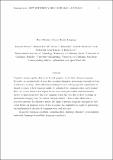How Efficiency Shapes Human Language
Author(s)
Gibson, Edward A; Futrell, Richard; Piantadosi, Steven; Dautriche, Isabelle; Mahowald, Kyle; Bergen, Leon; Levy, Roger Philip; Levy, Roger P; ... Show more Show less
DownloadGibson et al 2019 TICS.pdf (3.222Mb)
Alternative title
How Efficiency Shapes Human Language, TICS 2019
Terms of use
Metadata
Show full item recordAbstract
Cognitive science applies diverse tools and perspectives to study human language. Recently, an exciting body of work has examined linguistic phenomena through the lens of efficiency in usage: what otherwise puzzling features of language find explanation in formal accounts of how language might be optimized for communication and learning? Here, we review studies that deploy formal tools from probability and information theory to understand how and why language works the way that it does, focusing on phenomena ranging from the lexicon through syntax. These studies show how apervasive pressure for efficiency guides the forms of natural language and indicate that a rich future for language research lies in connecting linguistics to cognitive psychology and mathematical theories of communication and inference. Keywords: communication; cross-linguistic universals; language complexity; language efficiency; language evolution; language learnability
Date issued
2019-02Department
Massachusetts Institute of Technology. Department of Brain and Cognitive SciencesPublisher
Center for Open Science
Citation
Gibson, Edward, et al. “How Efficiency Shapes Human Language, TICS 2019.” PsyArXiv, 23 Feb. 2019. Web.
Version: Author's final manuscript